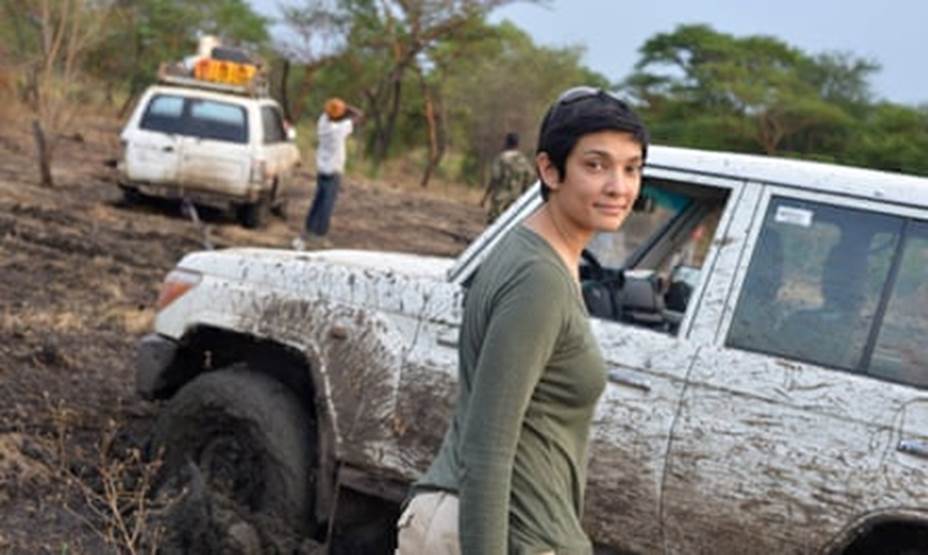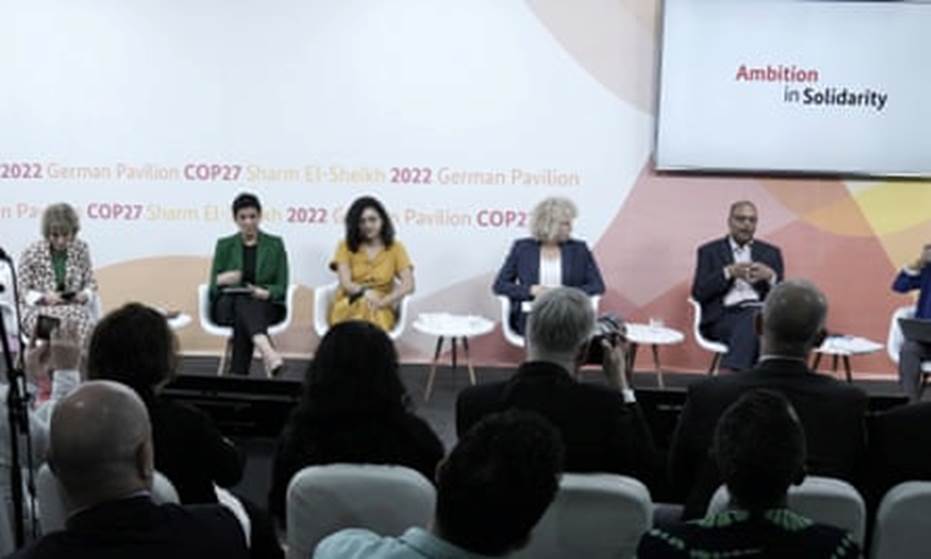
Tirana Hassan in South Sudan in 2014 - Photograph Samer Muscati/Human Rights Watch
Human Rights and Wrongs: The Australian Calling out Oppression at Home and around the World
By Daniel Hurst
Tirana Hassan may be responsible for calling out abuses around the world, but the new global head of Human Rights Watch remains shocked by her home country of Australia’s “dehumanizing” treatment of asylum seekers and refugees.
Hassan visited the notorious Woomera immigration detention facility in central Australia when she was in the final year of a law degree and found “hundreds and hundreds of Iraqis, Iranians and Afghans who had just been wallowing without access to legal representation”.
“There was an unimaginable amount of dehumanizing treatment and essentially cruelty of the policy of the Australian government – and that fortified my determination around protection of human rights and refugee rights,” she says.
Two decades have passed since Hassan helped the lawyer Jeremy Moore establish the Woomera Lawyers Group, but the experience remains seared in her memory.
“Over the year that I was working there, it was one of the most desperate places I think that I’ve worked,” says Hassan, who is now based in New York.
As she takes the helm one of the world’s most prominent rights organizations, the experience may help explain why Hassan is so horrified that the UK government is now following Australia’s lead in sending asylum seekers to third countries and adopting “stop the boats” rhetoric.
“It’s abhorrent,” Hassan says. “To follow the path and to actually bring onboard some of the architects of one of the darkest moments in Australia’s human rights history is a shame and will be a blight on the UK’s international record.”
The resurgence of dehumanizing rhetoric and policies towards people fleeing persecution is just one of what Human Rights Watch has described as a “litany of human rights crises” around the globe.
Others include allegations of war crimes during Russia’s war on Ukraine, crimes against humanity in China, systemic discrimination against women and girls in Taliban-ruled Afghanistan, and a bloody crackdown on dissent in Iran.
But Hassan is undeterred by the sheer scale of the challenges sitting in her in-tray. “We need to be standing with those people who are affected and with the communities who are fighting back.”
‘The world was not an equal place’
Hassan – whose work has included a focus on protecting children and survivors of sexual and gender-based violence in conflict areas – grew up with first-hand experience of inequality and disrespect for human rights.
She was born in Singapore but her family migrated to Australia in the 1970s when Hassan was three.
“My father was an academic who had written a book on Singapore’s housing policy, and it essentially irritated the government of Singapore at the time and it was during the time where the government was cracking down on dissenting voices and opposing views,” she says.
“As pressure started to mount in terms of surveillance, with friends of my parents being detained and questioned, they realized that things were not going to get better for them.”
Hassan says her parents wanted to leave Singapore “before something happened to my father”. He secured a job at Flinders University in Adelaide.
“My mother is half Sri Lankan, half Chinese, so we talked about what it was like to live with racism and prejudice and we talked about inequality. I grew up with this sense that the world was not an equal place; that there were powers that existed and that when that power was wielded, in certain ways, it had dire consequences for people - people like my family.”
That prompted Hassan to pursue a career in social work – including counselling homeless young people.
“And from social work, I saw first-hand that systems exist in the world and those systems can sometimes be broken. I saw many kids that I worked with, young people that I worked with, especially those with mental health issues, disappear into a system. And so, I felt that I needed to go and find out how that system worked. That took me to law school.”
Hassan says when she later left Australia to work abroad, the country’s refugee policies were becoming “incredibly divisive”. She joined Human Rights Watch in 2010 as a senior researcher on emergencies in Africa, Asia and the Middle East. Hassan later led the crisis team at Amnesty International with a focus on using technology to investigate human rights abuses in Myanmar and Syria.
Human rights are ‘not a buffet’
Hassan wants to use her new role to call out the “very disappointing” practices of selective application of human rights, or trading off rights for political expediency.
Hassan says it was “irresponsible” for Australia’s then prime minister, Scott Morrison, to declare “ no country is perfect ” when asked about Amnesty International’s assessment that Israel was perpetrating apartheid against Palestinians (a report the Israeli government argued was “divorced from reality”).
Hassan vows to hold “hold all governments – no matter how big or how small” to the principle that human rights are not an optional extra. “And it’s not a buffet at which governments can walk around and just choose which parts are their international obligations that they would like to adhere to.”

Tirana Hassan, second from left, in a panel discussion during the Cop 27 summit in Sharm el-Sheikh, Egypt - Photograph Nariman El-Mofty/AP
Deflection, she says, is a problem. One of the Chinese Communist party’s “favorite tactics” when confronted about human rights is to say “look at the United States or the UK or Australia”.
A lot of governments also try to argue human rights are a Western construct. “That’s a cheap tactic to deflect from serious abuses – in the case of China, crimes against humanity that are happening inside the country,” Hassan says, citing the report on Xinjiang by the UN high commissioner for human rights which China flatly rejects.
“I can tell you from Human Rights Watch’s decades of work in countries all over the world that the people who are being tortured, the families of the disappeared, those who want justice and accountability when their homes, their schools and their hospitals have been bombed in Syria or in Ukraine , they know what human rights are.
“They’ve suffered when they are being breached and they want to enjoy a life with dignity where their rights are respected.”
Australia must find its voice
Hassan says Australia has an important role to play on human rights – and that should include “speaking out and condemning what is happening in the Xinjiang region”.
“I think it’s most important that Australia actually is not scared to hold China to account and we expect to see Australia being a really important leader at, for example, the UN human rights council and within the multilateral fora, where these issues are being discussed,” she says.
But for Australia to improve its credibility to speak up on the world stage, it has also been urged to address its own deficiencies .
Hassan’s organization has criticized the over-representation of Indigenous people in the criminal justice system, new laws targeting climate protesters , the bipartisan policy of turning back asylum-seeker boats at sea, and continued support for fossil fuel developments. While Human Rights Watch credits the Albanese government with legislating stronger climate targets, it says Australia’s support for fossil fuel developments “contributes to the global climate crisis and undermines the right to a healthy environment”.
Hassan says climate change is a human rights issue and the impacts are becoming clearer. She welcomes Vanuatu’s push for an international legal ruling on polluters’ responsibility for the climate crisis, saying it “should be a wake-up call to Australia that they should be supporting their Pacific neighbors, instead of actually trying to skirt around the edges of really meaningful action to address climate change”.
Hassan says there is no time to waste in her new role and she is determined not to “sit on the sidelines”. – The Guardian

